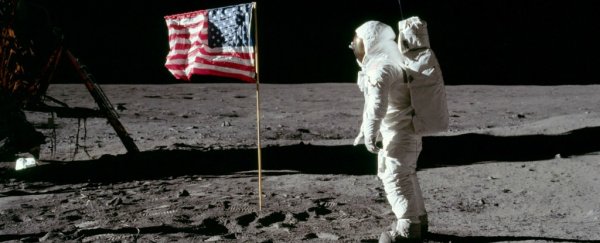Only 12 people have ever travelled so far as to touch the brightest object in our night sky - the Moon. All of these astronauts were male.
If the very first lunar mission was a small step for man, the next shall be a giant leap for women.
At the start of this week NASA announced an accelerated and ambitious plan to return to the Moon in just five years. This time, the space agency wants to make camp, and to get there it's taking an entirely different approach to the Apollo missions.
For starters, there will be a seat on the 2024 lunar mission specially reserved for a woman, the first to ever walk on the Moon. The program itself makes a sort-of bow to gender equality: it's named for the Greek goddess and twin sister of Apollo, the venerable Artemis.
"Fifty years after Apollo, the Artemis program will carry the next man and first woman to the Moon," said Bridenstine during a press call, according to CNN.
Symbolic or no, it will be the first time that a woman has ever walked across the surface of Earth's grey satellite.
ARTEMIS: Twin sister of Apollo and goddess of the Moon. Now, the name for our #Moon2024 mission to return @NASA_Astronauts to the surface of the Moon by 2024, including the first woman and next man. pic.twitter.com/1K9qIloZwp
— NASA (@NASA) May 13, 2019
Nevertheless, some remain skeptical that the mission will even happen. While certainly ambitious, the timeline borders on unrealistic, especially when you consider that Congress has yet to sign off on President Trump's upgraded budget, which includes an additional US$1.6 billion for the agency this year, and likely billions of dollars every year after.
Besides basic financing, the mission will also require the most powerful rocket ever designed, a new launch system, a fresh approach to lunar landing systems, a floating "gateway" station between Earth and the Moon that does not currently exist, and brand new lunar space suits for everyone.

It sounds like a squeeze, but the chief of NASA thinks the short timeline works in their favour. Today, in a town hall addressing NASA employees, he argued that to delay the goal, set out by Vice President Mike Pence in March, is actually a riskier alternative.
"Basically, the shorter the program is, the less time it takes, the less political risk we endure. In other words, we can accomplish the end state," he argued.
If it all works out, America will have an outpost on the way to Mars, quietly orbiting in the gravity between Earth and its Moon.
"Humans are the most fragile element of this entire endeavour and yet we go for humanity," a NASA video claims.
The mission has been named, now let's see if it can get off the ground.
